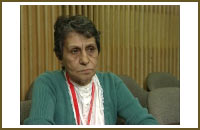Interview with Dr Selwa Zako, Senior media advisor with Iraq’s Communications and Media Commission

- © UNESCO
Over 100 Iraqi journalists attended the International Conference on Freedom of Expression and Media Development in Iraq, at UNESCO Headquarters from 8 to 10 January. Dr Selwa Zako, Senior media advisor with Iraq’s Communications and Media Commission (CMC) and editor-in-chief of monthly magazine, Tawasol (Communicate), spoke about her work in what has become the most dangerous country for journalists.
Interview by the UNESCO Bureau of Public Information
Do Iraqi journalists enjoy the press freedom enshrined in the country’s national legislation?
In the very beginning we really enjoyed freedom of speech and freedom of expression but later very gradually we started to lose this benefit because of political complications in the situation. As a journalist, you don’t have a gun and you cannot fight enemies you don’t see, so all you can do is try to protect yourself but for how long. When you see a fellow journalist killed in cold blood, I think the aim is not this journalist, that is one aim, the other aim (of the killers) is to scare you, to scare the rest. So we started to avoid telling the truth directly. But you can find ways to tell the truth in other words, that’s always possible.
Do you find that journalists in Iraq have the courage to use these ways tell the truth, despite the danger?
Yeah! There are many ways of telling the truth without saying it directly; you develop that ability but that is also a restriction. Some foreign journalists come and stay in hotels. The ones who collect the information and take pictures are the Iraqi journalists. They bring it to the foreign journalists because we need other people to hear about us. They are risking their lives to send the truth abroad. Most of the Iraqi news we hear from come from others, from [foreign] satellite channels and radios, not from our own newspapers or satellites. Newspapers and radio programmes say the very minimum, sometimes they turn a blind eye on a certain event, on a certain party that killed a fellow journalist. By the way, we know about the killers of most of journalists but we cannot say that. We know who is doing it and why, of course, but who is going to say this? This is really a risk.
What can we expect of conferences such as this one at UNESCO in terms of helping the media in Iraq?
We need unity, we are working as individuals, newspapers do not communicate with each other, TV channels, radios everyone is working alone. This kind of conference brings people together helps to cooperate. You cannot depend on the army or police to protect you, some people suggested that we are going to distribute guns to journalists but what sort of journalist is that? And how can you defend yourself with a gun? The only way is to draw an outline for the future on how to cooperate, how to help each other, how to talk to the international community.
And what can the international community do, in a concrete way?
They made a lot of mistakes and it is possible even now to put it on the right track again. There is time, very short time but it is possible. We are officially, by UN decision, under UN protection, so they have to do something about this, to help themselves as well. The last few months they realized very clearly that they have to do something about that.
How should they do this?
Put Iraq back on the right track, without these religious parties. Don’t you ever believe that they are strong, they are only strong because they are backed. Alone, all they have are some arms and money. But people are lost that’s why people are following them. Once people feel that there is a strong State no one will follow a religious party. We’ve never had that before. But people are in a desperate mood, they need someone to protect them. And these people tell them, “we can protect you” and they are much stronger than the government and the army. I am sure that if they had the will to do something, they would be able to do something. Don’t tell me they can’t.
What are the most urgent measures to be taken by the international community?
Not the international community, the coalition armies. They have to hit the militias first, this is the main danger facing us. And once you hit one of them the rest will keep quiet. Second, do something about the money and arms that are being poured into Iraq across all frontiers.
- 12-01-2007

